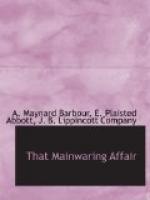“Do you refer to the mark of which Mr. Whitney has just spoken?”
“Yes.”
“What do you mean by designating it as ’the distinguishing mark between them’?”
Ralph Mainwaring turned from the casket and faced Mr. Sutherland, but his eyes had the strained, far-away look of one gazing into the distance, unconscious of objects near him.
“It was the mark,” he said, speaking with an effort, “by which, when we were boys, he was distinguished from his twin brother.”
“His twin brother, Harold Scott Mainwaring?” queried the attorney.
“Yes,” the other answered, mechanically.
“Do you then identify this as Hugh Mainwaring?”
“Yes; and the other — he must have been — no, no, it could not be — great God!” Ralph Mainwaring suddenly reeled and raised his hand to his head. Mr. Whitney sprang to his assistance and led him to his chair, but in those few moments he had aged twenty years.
A number of those most intimately acquainted with Hugh Mainwaring were then called upon, all of whom identified the dead man as their late friend and associate. These preliminaries over, Mr. Sutherland arose.
“Your honor and gentlemen of the jury, before proceeding with the testimony to be introduced, I have a brief statement to make. Soon after the commencement of this action, we came into possession of indisputable evidence that Hugh Mainwaring, the supposed victim of the Fair Oaks tragedy, was still living, and that of whatever crime, if crime there were associated with that fearful event, he was not the victim but the perpetrator. We determined at all hazards to secure him, first as a witness in this case, our subsequent action to be decided by later developments. Through our special detective we succeeded in locating him, but he, upon finding himself cornered, supposing he was to be arrested for the murder of his brother, attempted suicide by shooting. The combined skill of the best surgeons obtainable, though unable to save him, yet prolonged life for three days, long enough to enable two of our number, Mr. Barton and Mr. Montague, to reach him in season to take his dying statement; a statement not only setting forth the facts relating to the will in question, but embracing also the details of the Fair Oaks tragedy and mystery. This statement, made by Hugh Mainwaring and attested by numerous witnesses present, will now be read by Mr. Montague.”
Amid an impressive silence, Mr. Montague stepped to the side of the casket and, unfolding a document which he held, read the following:
“I, Hugh Mainwaring, freely and voluntarily and under no duress or compulsion, make this, my dying statement, not only as a relief to the mental anguish I have endured for the past few months, but also in the hope that I may thereby, in my last hours, help in some degree to right the wrong which my life of treachery and cowardice has wrought. To do this, I must go back over twenty-five years of crime, and beyond that to the inordinate greed and ambition that led to crime.




